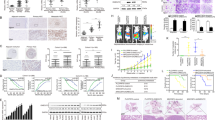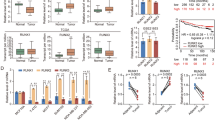Abstract
Tartrate-resistant acid phosphatase 5 (ACP5), which is essential for bone resorption and osteoclast differentiation, promotes cell motility through the modulation of focal adhesion kinase phosphorylation. However, whether ACP5 contributes to the metastasis and progression of hepatocellular carcinoma (HCC) remains unknown. In this paper, a complementary DNA microarray, serial deletion, site-directed mutagenesis and a chromatin immunoprecipitation assays confirmed that ACP5 is a direct transcriptional target of Forkhead box M1 (FoxM1). ACP5 expression was markedly higher in HCC tissues compared with adjacent noncancerous tissues. ACP5 overexpression was correlated with microvascular invasion, poor differentiation and higher tumor-node-metastasis stage. HCC patients with positive ACP5 expression had poorer prognoses than those with negative ACP5 expression. A multivariate analysis revealed that ACP5 expression was an independent and significant risk factor for disease recurrence and reduced-patient survival following curative resection. Transwell assays and an orthotopic metastatic model showed that the upregulation of ACP5 promoted HCC invasion and lung metastasis, whereas ACP5 knockdown inhibited these processes. The knockdown of ACP5 significantly attenuated FoxM1-enhanced invasion and lung metastasis. Immunohistochemistry revealed that ACP5 expression was positively correlated with FoxM1 expression in human HCC tissues, and their coexpression was associated with poor prognoses. In summary, ACP5 is a direct transcriptional and functional target of FoxM1. This novel FoxM1/ACP5 signaling pathway promotes HCC metastasis and may be a candidate biomarker for prognosis and a target for new therapies.
This is a preview of subscription content, access via your institution
Access options
Subscribe to this journal
Receive 50 print issues and online access
$259.00 per year
only $5.18 per issue
Buy this article
- Purchase on Springer Link
- Instant access to full article PDF
Prices may be subject to local taxes which are calculated during checkout





Similar content being viewed by others
References
Yang JD, Roberts LR . Hepatocellular carcinoma: a global view. Nat Rev Gastroenterol Hepatol 2010; 7: 448–458.
El-Serag HB, Marrero JA, Rudolph L, Reddy KR . Diagnosis and treatment of hepatocellular carcinoma. Gastroenterology 2008; 134: 1752–1763.
El-Serag HB . Hepatocellular carcinoma. N Engl J Med 2011; 365: 1118–1127.
Raychaudhuri P, Park HJ . FoxM1: a master regulator of tumor metastasis. Cancer Res 2011; 71: 4329–4333.
Bao B, Wang Z, Ali S, Kong D, Banerjee S, Ahmad A et al. Over-expression of FoxM1 leads to epithelial-mesenchymal transition and cancer stem cell phenotype in pancreatic cancer cells. J Cell Biochem 2011; 112: 2296–2306.
Dai B, Kang SH, Gong W, Liu M, Aldape KD, Sawaya R et al. Aberrant FoxM1B expression increases matrix metalloproteinase-2 transcription and enhances the invasion of glioma cells. Oncogene 2007; 26: 6212–6219.
Wang IC, Chen YJ, Hughes DE, Ackerson T, Major ML, Kalinichenko VV et al. FoxM1 regulates transcription of JNK1 to promote the G1/S transition and tumor cell invasiveness. J Biol Chem 2008; 283: 20770–20778.
Wang Z, Banerjee S, Kong D, Li Y, Sarkar FH . Down-regulation of Forkhead Box M1 transcription factor leads to the inhibition of invasion and angiogenesis of pancreatic cancer cells. Cancer Res 2007; 67: 8293–8300.
Huang C, Qiu Z, Wang L, Peng Z, Jia Z, Logsdon CD et al. A novel FoxM1-caveolin signaling pathway promotes pancreatic cancer invasion and metastasis. Cancer Res 2012; 72: 655–665.
Park HJ, Gusarova G, Wang Z, Carr JR, Li J, Kim KH et al. Deregulation of FoxM1b leads to tumour metastasis. EMBO Mol Med 2011; 3: 21–34.
Wang X, Quail E, Hung NJ, Tan Y, Ye H, Costa RH . Increased levels of forkhead box M1B transcription factor in transgenic mouse hepatocytes prevent age-related proliferation defects in regenerating liver. Proc Natl Acad Sci USA 2001; 98: 11468–11473.
Wang X, Kiyokawa H, Dennewitz MB, Costa RH . The Forkhead Box m1b transcription factor is essential for hepatocyte DNA replication and mitosis during mouse liver regeneration. Proc Natl Acad Sci USA 2002; 99: 16881–16886.
Kalinichenko VV, Major ML, Wang X, Petrovic V, Kuechle J, Yoder HM et al. Foxm1b transcription factor is essential for development of hepatocellular carcinomas and is negatively regulated by the p19ARF tumor suppressor. Genes Dev 2004; 18: 830–850.
Gusarova GA, Wang IC, Major ML, Kalinichenko VV, Ackerson T, Petrovic V et al. A cell-penetrating ARF peptide inhibitor of FoxM1 in mouse hepatocellular carcinoma treatment. J Clin Invest 2007; 117: 99–111.
Calvisi DF, Pinna F, Ladu S, Pellegrino R, Simile MM, Frau M et al. Forkhead box M1B is a determinant of rat susceptibility to hepatocarcinogenesis and sustains ERK activity in human HCC. Gut 2009; 58: 679–687.
Sun H, Teng M, Liu J, Jin D, Wu J, Yan D et al. FOXM1 expression predicts the prognosis in hepatocellular carcinoma patients after orthotopic liver transplantation combined with the Milan criteria. Cancer Lett 2011; 306: 214–222.
Xia L, Huang W, Tian D, Zhu H, Zhang Y, Hu H et al. Upregulated FoxM1 expression induced by hepatitis B virus X protein promotes tumor metastasis and indicates poor prognosis in hepatitis B virus-related hepatocellular carcinoma. J Hepatol 2012; 57: 600–612.
Xia L, Mo P, Huang W, Zhang L, Wang Y, Zhu H et al. The TNF-alpha/ROS/HIF-1-induced upregulation of FoxMI expression promotes HCC proliferation and resistance to apoptosis. Carcinogenesis 2012; 33: 2250–2259.
Halleen JM, Alatalo SL, Janckila AJ, Woitge HW, Seibel MJ, Vaananen HK . Serum tartrate-resistant acid phosphatase 5b is a specific and sensitive marker of bone resorption. Clin Chem 2001; 47: 597–600.
Adams LM, Warburton MJ, Hayman AR . Human breast cancer cell lines and tissues express tartrate-resistant acid phosphatase (TRAP). Cell Biol Int 2007; 31: 191–195.
Honig A, Rieger L, Kapp M, Krockenberger M, Eck M, Dietl J et al. Increased tartrate-resistant acid phosphatase (TRAP) expression in malignant breast, ovarian and melanoma tissue: an investigational study. BMC Cancer 2006; 6: 199.
Capeller B, Caffier H, Sutterlin MW, Dietl J . Evaluation of tartrate-resistant acid phosphatase (TRAP) 5b as serum marker of bone metastases in human breast cancer. Anticancer Res 2003; 23: 1011–1015.
Chao TY, Yu JC, Ku CH, Chen MM, Lee SH, Janckila AJ et al. Tartrate-resistant acid phosphatase 5b is a useful serum marker for extensive bone metastasis in breast cancer patients. Clin Cancer Res 2005; 11: 544–550.
Lyubimova NV, Pashkov MV, Tyulyandin SA, Gol’dberg VE, Kushlinskii NE . Tartrate-resistant acid phosphatase as a marker of bone metastases in patients with breast cancer and prostate cancer. Bull Exp Biol Med 2004; 138: 77–79.
Wu YY, Janckila AJ, Ku CH, Yu CP, Yu JC, Lee SH et al. Serum tartrate-resistant acid phosphatase 5b activity as a prognostic marker of survival in breast cancer with bone metastasis. BMC Cancer 2010; 10: 158.
Zenger S, He W, Ek-Rylander B, Vassiliou D, Wedin R, Bauer H et al. Differential expression of tartrate-resistant acid phosphatase isoforms 5a and 5b by tumor and stromal cells in human metastatic bone disease. Clin Exp Metastasis 2011; 28: 65–73.
Scott KL, Nogueira C, Heffernan TP, van Doorn R, Dhakal S, Hanna JA et al. Proinvasion metastasis drivers in early-stage melanoma are oncogenes. Cancer Cell 2011; 20: 92–103.
Laoukili J, Stahl M, Medema RH . FoxM1: at the crossroads of ageing and cancer. Biochim Biophys Acta 2007; 1775: 92–102.
McLean GW, Carragher NO, Avizienyte E, Evans J, Brunton VG, Frame MC . The role of focal-adhesion kinase in cancer—a new therapeutic opportunity. Nat Rev Cancer 2005; 5: 505–515.
Scott KL, Nogueira C, Heffernan TP, van Doorn R, Dhakal S, Hanna JA et al. Proinvasion metastasis drivers in early-stage melanoma are oncogenes. Cancer Cell 2011; 20: 92–103.
Mitra SK, Hanson DA, Schlaepfer DD . Focal adhesion kinase: in command and control of cell motility. Nat Rev Mol Cell Biol 2005; 6: 56–68.
Li Y, Tang ZY, Hou JX . Hepatocellular carcinoma: insight from animal models. Nat Rev Gastroenterol Hepatol 2012; 9: 32–43.
Xia L, Tian D, Huang W, Zhu H, Wang J, Zhang Y et al. Upregulation of IL-23 expression in patients with chronic hepatitis B is mediated by the HBx/ERK/NF-kappaB pathway. J Immunol 2012; 188: 753–764.
Edmondson HA, Steiner PE . Primary carcinoma of the liver: a study of 100 cases among 48,900 necropsies. Cancer 1954; 7: 462–503.
Acknowledgements
This study was supported by combined grants from the National Natural Science Foundation of China (No. 81272652, No. 81172290, No. 91129723, No.81090270, No.81090273 and No.81120108005), the National Key and Basic Research Development Program of China (No. 2010CB529302 and 2010CB529306), the National Municipal Science and Technology Project (2009ZX09103-667 and 2009ZX09301-009-RC06) and the Chinese Postdoctoral Science Foundation (No. 20100471776 and No.201104757).
Author information
Authors and Affiliations
Corresponding authors
Ethics declarations
Competing interests
The authors declare no conflict of interest.
Additional information
Supplementary Information accompanies this paper on the Oncogene website
Supplementary information
Rights and permissions
About this article
Cite this article
Xia, L., Huang, W., Tian, D. et al. ACP5, a direct transcriptional target of FoxM1, promotes tumor metastasis and indicates poor prognosis in hepatocellular carcinoma. Oncogene 33, 1395–1406 (2014). https://doi.org/10.1038/onc.2013.90
Received:
Revised:
Accepted:
Published:
Issue Date:
DOI: https://doi.org/10.1038/onc.2013.90
Keywords
This article is cited by
-
Prediction of chemoresistance trait of cancer cell lines using machine learning algorithms and systems biology analysis
Journal of Big Data (2021)
-
Cathepsin K regulates localization and secretion of Tartrate-Resistant Acid Phosphatase (TRAP) in TRAP-overexpressing MDA-MB-231 breast cancer cells
BMC Molecular and Cell Biology (2020)
-
Aberrant activation of hedgehog signaling promotes cell proliferation via the transcriptional activation of forkhead Box M1 in colorectal cancer cells
Journal of Experimental & Clinical Cancer Research (2017)
-
Tartrate-resistant acid phosphatase (TRAP/ACP5) promotes metastasis-related properties via TGFβ2/TβR and CD44 in MDA-MB-231 breast cancer cells
BMC Cancer (2017)
-
Transcriptome profile of rat genes in injured spinal cord at different stages by RNA-sequencing
BMC Genomics (2017)



